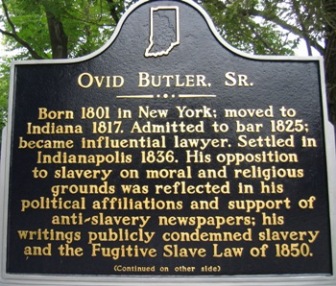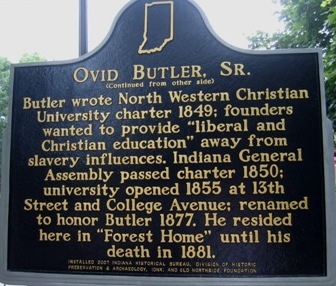

Location: 1306 North Park Ave., Indianapolis. (Marion County, Indiana)
Installed: 2007 Indiana Historical Bureau, Division of Historic Preservation and Archaeology, IDNR, Old Northside Foundation
ID# : 49.2007.2
Text
Side one:
Born 1801 in New York; moved to Indiana 1817. Admitted to bar 1825; became influential lawyer. Settled in Indianapolis 1836. His opposition to slavery on moral and religious grounds was reflected in his political affiliations and support of anti-slavery newspapers; his writings publicly condemned slavery and the Fugitive Slave Law of 1850.
Side two:
Butler wrote North Western Christian University charter 1849; founders' wanted to provide "liberal and Christian education" away from slavery influences. Indiana General Assembly passed charter 1850; university opened 1855 at 13th Street and College Avenue; renamed to honor Butler 1877. He resided here in "Forest Home" until his death in 1881.
Keywords
Education, Newspapers and Media
Annotated Text
Side one:
Born 1801 in New York; moved to Indiana 1817. Admitted to bar 1825; became influential lawyer. Settled in Indianapolis 1836.(1) His opposition to slavery on moral and religious grounds was reflected in his political affiliations and support of anti-slavery newspapers; his writings publicly condemned slavery and the Fugitive Slave Law of 1850.(2)
Side two:
Butler wrote North Western Christian University charter 1849; founders' wanted to provide "liberal and Christian education" away from slavery influences. Indiana General Assembly passed charter 1850; university opened 1855 at 13th Street and College Avenue; renamed to honor Butler 1877.(3) He resided here in "Forest Home" until his death in 1881.(4)
Notes:
1. Ovid Butler, Sr. was born February 2, 1801 in Augusta, New York. His family moved to Jennings County, Indiana in 1817. Ovid began studying law in 1824, and was admitted to the bar in 1825. He moved to Shelbyville and practiced law until 1836, at which time he moved to Indianapolis and began a partnership with Calvin Fletcher.
Butler married Cordelia Cole on April 19, 1827 in Shelby County. "Ovid Butler and Cordelia Dyer Cole, " Indiana State Library Genealogy Database: Marriages through 1850, http://digital.statelib.lib.in.us/db/marriages_display.asp?ID=40919, (accessed November 28, 2005).
Cordelia died in 1838, and Butler married Elizabeth Elgin on June 2, 1840 in Marion County. "Ovid Butler and Elizabeth Ann Elgin, " Indiana State Library Genealogy Database: Marriages through 1850, http://digital.statelib.lib.in.us/db /marriages_display.asp?ID=41730 (accessed November 28, 2005).
The following sources provide biographical information for Ovid Butler, Sr., along with supporting evidence for each of the general statements made in the text. Therefore, these sources are only listed here, and not in each individual footnote:
Obituaries: "Death of Ovid Butler, Sr., " Indianapolis News, July 12, 1881; "Obituary, Ovid Butler, " Indianapolis Journal, July 13, 1881, p. 4, columns 4 and 5; "Ovid Butler, Sr., His Death Yesterday-Sketch of His Life, " Indianapolis Daily Sentinel, July 13, 1881, p. 8, columns 3 and 4.
Works by Contemporaries:Pictorial and Biographical Memoirs of Indianapolis and Marion County, Indiana, Together with Biographies of Many Prominent Men of Other Portions of the State, Both Living and Dead (Chicago, 1893), 204-205; John H. B. Nowland, Sketches of Prominent Citizens of 1876, With a Few of the Pioneers of the City and County Who Have Passed Away (Indianapolis, 1877), 523-26; B. R. Sulgrove, History of Indianapolis and Marion County (Philadelphia, 1884), 175-78; Gayle Thornbrough, and Paula Corpuz, The Diary of Calvin Fletcher, 9 vols. (Indianapolis, 1983).
Modern Works: Emma Lou Thornbrough, Indiana in the Civil War Era, 1850-1880 (Indianapolis, 1965), 23, 518; Connie J. Zeigler, "Butler, Ovid, " in Encyclopedia of Indianapolis, ed. David J. Bodenhamer and Robert G. Barrows (Bloomington, 1994), 370-71.
Manuscript Collections: Ovid Butler Collection, Special Collections and Rare Books, Irwin Library, Butler University, Indianapolis, located at:
http://www.butler.edu/library/libinfo/rare/butler.pdf; Ovid Butler (1801-1881) Papers, 1841-1893, Manuscript and Visual Collections Department, William Henry Smith Memorial Library, Indiana Historical Society, Indianapolis, Collection # M 0036, VB 1011.
2. Butler abandoned the Democratic party in 1848 to join the Free Soil party. He served on numerous committees within the Free Soil party organization and served as a presiding officer over many Free Soil and Free Territory conventions. He was named as a delegate on the Free Soil ticket in both 1848 and 1852. In addition, he was appointed to a committee for providing aid to Kansas in 1856, and was elected as the Recording Secretary for the Indianapolis Freedmen's Aid Commission, organized by Levi Coffin in 1863. "Free Territory State Convention, " Indiana State Journal, August 7, 1848; "Free Soil Ticket, " Centerville Free Territory Sentinel, September 6, 1848; "Indiana Free Soil State Convention, " National Era (Washington, D.C.), June 3, 1852, p. 91; "Independent Democracy of Indiana, " National Era, February 10, 1853, p. 4; "Freedmen's Aid Commission of Indiana, " Indianapolis Daily Journal, September 3, 1863. See also Thornbrough and Corpuz, 4: 61n, 64, 5: 497n, 564n, 8: 199n; David G. Vanderstel, "Antislavery Movement, " in Encyclopedia of Indianapolis, 264-65.
Butler is believed to have financially backed the Free Soil Banner, established in 1848, and to have established the Free Democrat, in 1854, both published in Indianapolis. Thornbrough and Corpuz, 4: 61n; Vanderstel, 265. "Death of Ovid Butler, Sr., " Indianapolis News, July 12, 1881; "Ovid Butler, Sr., His Death Yesterday-Sketch of His Life, " Indianapolis Daily Sentinel, July 13, 1881, p. 8, columns 3 and 4; Ovid Butler (1801-1881) Papers, 1841-1893, Manuscript and Visual Collections Department, William Henry Smith Memorial Library, Indiana Historical Society, Indianapolis, Collection # M 0036, VB 1011.
Butler disagreed with Alexander Campbell, founder of the Disciples of Christ in Indiana, regarding the appropriate response of the church to the slavery issue. Whereas Campbell believed this was a political issue that should be fought by politicians, Butler and other Disciples felt obligated to participate in the abolition of slavery. Butler and Campbell especially disagreed over the Fugitive Slave Law of 1850 in that Campbell advocated humility and obedience to the law, while Butler vehemently believed such a stance was in direct opposition to the Scriptures and his faith. Butler wrote a letter to Campbell on March 29, 1851, in which he denounces the Fugitive Slave Law of 1850, stating, "As a man, and as a Disciple of Jesus, I am constrained to regard its provisions as violations of the principle of humanity, and as contravening the statutes and institutes of the Lord Christ." Ovid Butler to Alexander Campbell, March 29, 1851, The Millennial Harbinger, conducted by Alexander Campbell, 1851, pp. 430-34 photostat of original in Manuscript Section, Indiana State Library, Indianapolis, Indiana. Thornbrough, Indiana in the Civil War Era, 22-23, specifically discusses the conflict between Ovid Butler and Alexander Campbell over the issue of slavery.
Butler also carried on a public debate with Jeremiah Smith over the issue of slavery, in which essays by both individuals were published in The Christian Record, and later published in a compilation by Smith. In an essay published by The Christian Record on May 20, 1862, Butler states that "American slavery, as established, recognized, or permitted by the laws of the slaveholding States, and exemplified in the condition, character and conduct of both masters and slaves, is sin against God, and against humanity." Ovid Butler to Jeremiah Smith, Indianapolis, April 29, 1862, in Is Slavery Sinful?: Being Partial Discussions of the Proposition, Slavery is Sinful, between Ovid Butler, Esq., a Bishop of the Christian Church, at Indianapolis, Ind., and Jeremiah Smith, Esq., Late Judge of the 11th and 13th Judicial Circuits, Ind.: and between Elder Thomas Wiley, Late Pastor of the Christian Church, at Union City, Ind., and Jeremiah Smith, Late Judge of the 11th and 13th Judicial Circuits, Indiana: with an Introduction, Episode, and Conclusion of the Discussion, Jeremiah Smith (Indianapolis, 1863).
Additional published essays include: "The President's Scheme of Compromise, " a series of three articles in which Butler states his opposition to slavery. Indianapolis Daily Journal, December, 11, 12, 13, 1860; "State Free Democratic Association, " Free Democrat, January 20, 1853 (and subsequent issues as well).
Manuscript copies of Butler's antislavery and religious essays are in Ovid Butler (1801-1881) Papers, 1841-1893, Indiana Historical Society.
In his correspondence to his son Scot during the Civil War, Butler mentions his personal opposition to slavery. Barbara Butler Davis, ed., Affectionately Yours: The Civil War Home-Front Letters of the Ovid Butler Family (Indianapolis, 2004).
3. Butler wrote the charter for North Western Christian University in 1849, and the Indiana General Assembly approved the charter in 1850. Butler was quoted in the Indianapolis Daily Journal in 1876 as saying, "The institution originated in the desire of its founders and early patrons for an institution of learning of the highest class upon free soil, in which their children and the youth of the Northwest might receive a liberal and Christian education, removed, as far as practicable, from the pernicious influences of slavery." "The Northwestern Christian University, " Indianapolis Daily Sentinel, February 22, 1876, p. 10; George M. Waller, "Butler University, " Encyclopedia of Indianapolis, 372-74.
Butler's commitment to education included participation in the Indiana "State Common School Conventions, " begun in 1847: Richard G. Boone, A History of Education in Indiana (1892; reprint, Indianapolis, 1941), 96; Thornbrough and Corpuz, 3: 343n, 380-82; Donald F. Carmony, Indiana, 1816-1850: The Pioneer Era (Indianapolis, 1998), 381-82.
4. "The Marion County deed records show that on January 14, 1837, C.F. conveyed to Ovid Butler Lots 10, 11, and 12 in Square 39 for the consideration of $1, 000. C.F. had acquired the entire square from the agent of state for $732, the deed being recorded October 3, 1835." Thornbrough and Corpuz, 1: 401n; Deed, Agent of State to Calvin Fletcher, October 3, 1835, Marion County Indiana Deed Records, Book E, p. 577-78, Indiana State Library, microfilm.
After his death, Ovid's son Scot occupied the house, known as "Forest Home", before selling it to John M. Shaw around 1891, "Old Northside Master Plan, " Indianapolis Historic Preservation Commission, 1977.
Ovid Butler to Alexander Campbell, Forest Home, (near Indianapolis) March 29, 1851.
